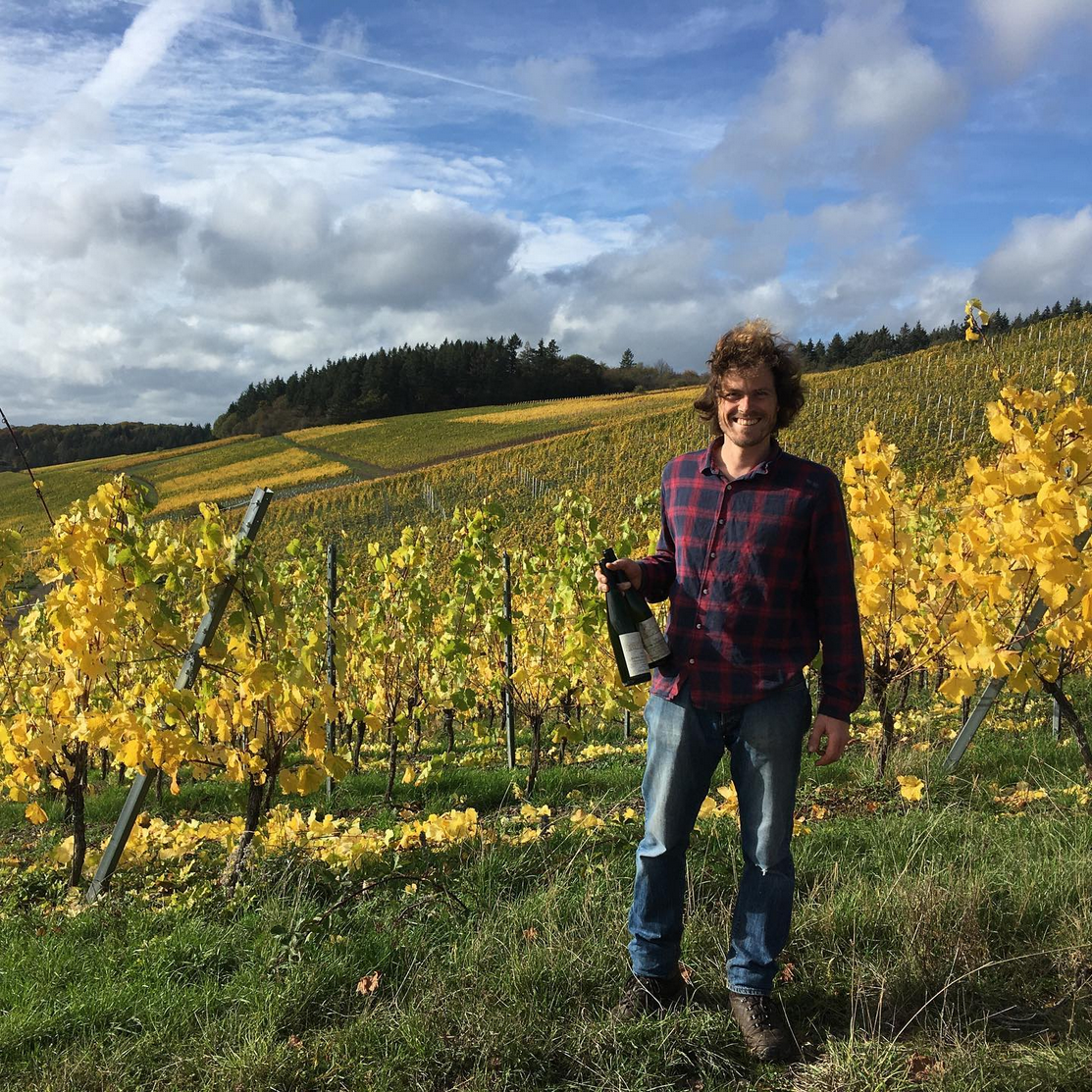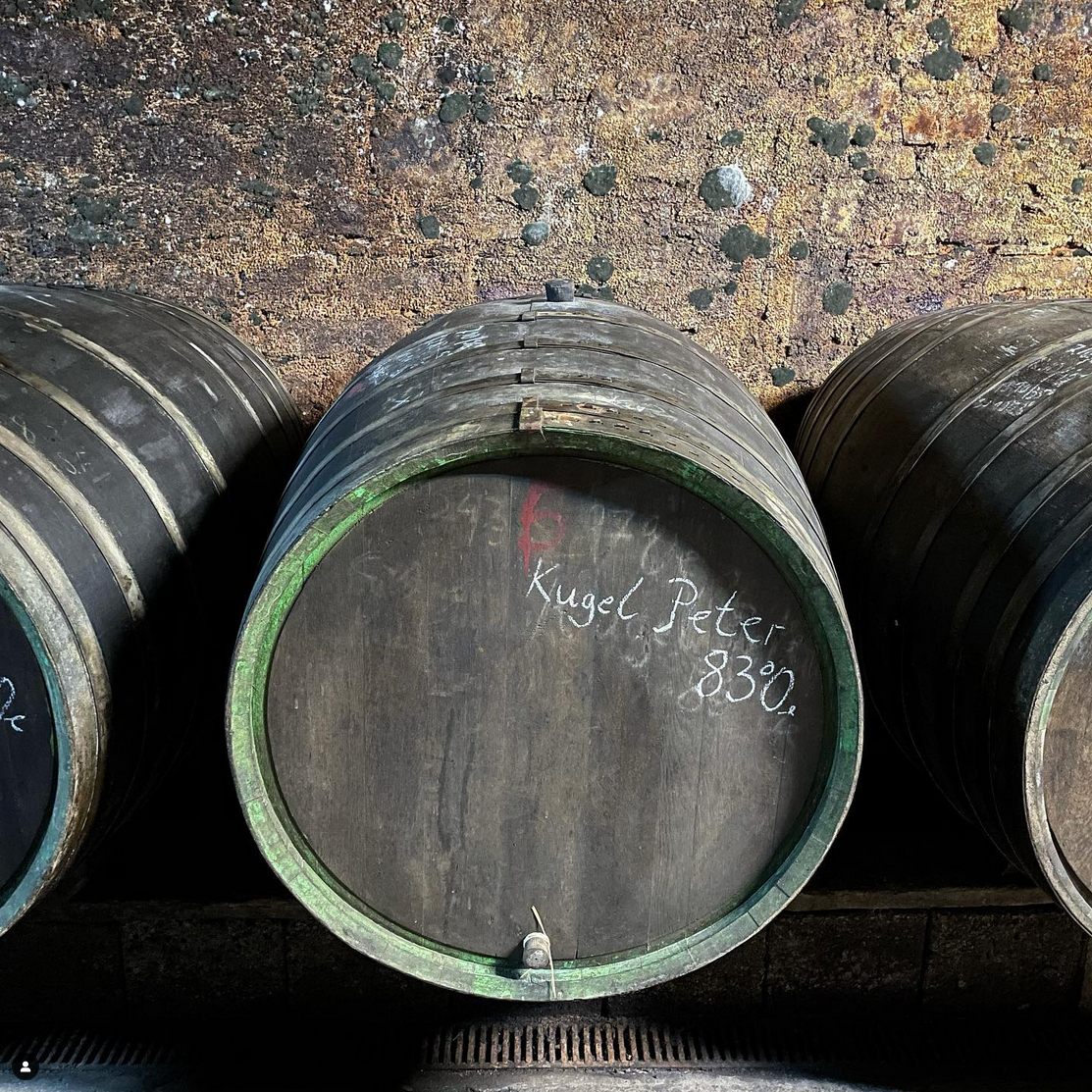HOFGUT FALKENSTEIN
Erich and Johannes Weber
© Hofgut Falkenstein
Johannes Weber
The Estate
The Weber family farms about 13 hectares in a side valley of the Saar known as Konzer Tälchen, making traditional and dry tasting Rieslings.
Most of their vineyards are located on various south-facing slopes, including Niedermenniger Herrenberg—listed as “Zuckerberg” on Franz Josef Clotten’s 1868 Saar und Mosel Weinbau-Karte—and the once highly rated Euchariusberg. The soil is primarily iron-rich gray slate, with some quartz and quartzite-bearing sandstone, along with diabase intrusions in the choice western flank of Krettnacher Altenberg (called Silberberg in the mid-20th century). The father-and-son team of Erich and Johannes Weber don’t use herbicides and believe in low yields—just one short “flat” or non-arched cane (Flachbogen) per vine—to produce an array of dry (trocken), off-dry (feinherb), and fruity Saar wines, which represent true cask-by-cask bottlings.
The AP numbers (with the bottling or batch number in a large, bold print) specify the exact cask, or Fass, which, for the most part, is nicknamed after the former owner of a given parcel; a few casks are named after old site names or place names, such as Auf dem Hölzchen—which, like Ober Schäfershaus, is in the prime Silberberg sector of “Crettnacherberg”—or Im Kleinschock, marked as “Schock” on Clotten’s 1868 “Viticultural Map of the Saar and Mosel.” Depending on the size of the parcel and the yield of the vintage, some casks are from two or more parcels in a given sector, which the Webers harvest en bloc, or all at one time. There needs to be enough for one press load. Most of the wines come from old vines with an average age 40-50 years old.
From Hofgut Falkenstein
Viticulture and Vinification
The Webers never use artificial fertilizers and are cautious of over-tilling the soil, two measures that can cause too much vine vigor and eventually lead to rot at harvest time. All the grapes are hand-harvested (including those grapes, mostly from young vines, that are sold in bulk to the local co-op). The Riesling grapes are gently pressed for two to three hours, and their musts are left overnight to settle naturally, before being racked and fermented with ambient yeasts in 1,000-liter Fuder casks (Fuderfässer) and a couple of 500-liter Halbfuder, the traditional fermenting and aging vessels for Mosel wine.
The Webers neither chaptalize nor de-acidify any of their wines (including trocken and feinherb), and thus indicate all of these as Prädikatsweine (Kabinett, Spätlese, Auslese), which, pre-1971 Wine Law, were called Naturweine, or “natural wines.” They also shun cultured yeasts and yeast nutrients. (That’s why so few wines fermented dry in the 2018 vintage.) In the cellar, they eschew enzymes, fining agents (such as bentonite and charcoal), cultured yeasts, thiamine (vitamin B1), and diammonium phosphate (DAP). They don’t even have a chamber filter press for filtering the dregs after sedimentation. Instead of hiring a contract bottler, the Webers prefer to bottle their wines themselves, cask by cask, straight off the gross lees with no prior pumping, racking, or filtering. During bottling, they neither use a vacuum pump nor an absolute cartridge membrane filter, and they never inject carbon dioxide, such as Carbofresh, at bottling. Their wines have a natural spritz, which is preserved in the bottle.
From Hofgut Falkenstein
Wines Produced
Niedermenniger Herrenberg Riesling Kabinett Trocken
Niedermenniger Sonnenberg Riesling Kabinett Trocken
Krettnacher Auf Dem Hölzchen Riesling Kabinett Trocken
Krettnacher Altenberg Riesling Spätlese Trocken
Krettnacher Ober Schäfershaus Riesling Spätlese Trocken
Niedermenniger Herrenberg Riesling Kabinett Feinherb
Niedermenniger Im Kleinschock Riesling Kabinett
Krettnacher Euchariusberg Riesling Kabinett
Ockfener Bockstein Riesling Kabinett
Ockfener Bockstein Riesling Kaabinett Alte Reben
Krettnacher Euchariusberg Riesling Kabinett Alte Reben
Krettnacher Euchariusberg Riesling Spälese
Krettnacher Euchariusberg Riesling Auslese
Niedermenniger Herrenberg Weiẞburgunder Trocken
Niedermenniger Herrenberg Rotwein Trocken
Niedermenniger Herrenberg Rosé Trocken
Falkensteiner Pét-Nat
Falkensteiner Landwein Trocken (Unsulfured White Wine)
Critical Praise
“Of course, for a combination of complexity, finesse and low alcohol in dry Riesling, you need look no further – especially this year – than Hofgut Falkenstein.”
David Schildknecht, Vinous.com
“If you are interested in superb, classic, highly individual Saar Rieslings, Hofgut Falkenstein is one of the very best addresses... Unfortunately, the Falkensteiner Rieslings are fast-selling wines. You need to have a great relationship with your supplier, because even at the domaine you won't get a bottle to buy, only to drink. Erich and Johannes Weber could sell each bottle at least two times. There is no other domain that is as "hot" as the Falkensteiner Hof right now.”
Stephan Reinhardt, Robertparker.com
“The Estate has been a fine source for steely expressions of Saar Riesling since the start. However, the level of finesse has soared over the last few years while the ethos of the Webers remained unchanged: “We want to produce light-weighted, playful, and complex wines. This expresses the beauty of our Saar vineyards so well.”… The resulting wines show stunning brightness and delicacy. They are intense yet gorgeously light-footed … and they embrace acidity. The wines need time ... as did most of the great Mosel wines from the 1980s and the 1990s. The Estate has been on fire since 2014 (we amply reported on it), and its wines have been fixed features in our list of yearly highlights for years now, and this in all stylistic directions.”
Mosel Fine Wines
GENERAL INFORMATION
Country: GermanyRegion: MoselAppellation: SaarFounded: 1985Annual Production: 3,000 casesFarming: Traditional and organic




